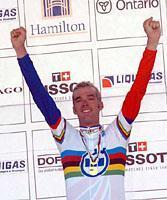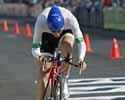Cycling News Extra for July 21, 2004Edited by Gerard Knapp Millar's confession - Dodger's worlds may be golden after allBy Gerard Knapp
In what has been the bleakest month in its history, the sport of cycling in Australia may have cause for some small celebration that is due - ironically - to a high-profile doping case in another country. But it's not yet another Australian rider being forced to clear his name due to unsubstantiated allegations and politically-motivated witch-hunts. Rather, it is Michael Rogers, arguably the country's most talented road rider and currently the highest-ranked Australian on GC at the Tour de France, who appears likely to be recognised as the 2003 world individual time trial champion. Rogers' recognition may come as a result of the admission by the high-profile British cyclist, David Millar, that he used EPO in 2001 and 2003. The Cofidis team confirmed this week that Millar would be sacked as a result of his admission to the use of EPO and the UCI (International Cycling Union) considers an admission to doping on par with a positive test, so Millar will almost certainly be stripped of his world time trial championship from the Hamilton, Canada world's last October.
The rainbow jersey would, in that case, be passed to the Australian, Rogers, who finished second, with bronze medallist Uwe Peschel (Germany) and fourth-placed Michael Rich (also from Germany), receiving the silver and bronze medals, respectively. In Canada last year, Millar was the clear winner and trounced the field, completing the 41.3km course in 51.17.3 at an average speed of 48.319 km/h. But the time gaps are significant. Rogers came home nearly one and a half minutes slower (1.25.1 behind) while Peschel was only 0.5 seconds behind Rogers, finishing in 1.25.6, while Rich was a further 10 seconds back in 1.35.7. Rogers did puncture his rear wheel 8km from the finish, which he estrimates cost him about 30 seconds. However, Millar's winning margin over second-placed Rogers (1.25) covers the next 14 riders who came across the line, as 1.20 separates Rogers from 15th-placed Laszlo Bodrogi (Hungary), who came in 2.45.1 down on the flying Scot (see full report and results). Earlier in his career, Millar had finished second in the 2001 road worlds ITT to Germany's Jan Ullrich, by only six seconds. "I dreamed of being world champion, and I succeeded, but I cheated," Millar commented in a l'Equipe interview published Tuesday. Currently, Rogers is only concentrating on today's all-important ITT up the legendary climb of Alpe d'Huez. He told Cyclingnews yesterday: "I'll do my best in the (Alpe d'Huez) time-trial, I'll see how I go. I'm still hoping to make it into the top 20", he said of his ambitions for the overall general classification at the Tour de France (currently he's in 27th position on GC and seventh in the young rider competition). "I would have like to be in the front today (stage 15) but it's just getting harder and harder. Tomorrow, Alpe d'Huez and then the next day… Everyone's shaking, they will be scary days. I know I've improved so much over the last year. I've got nothing to prove here." Not a first for the UCI
It is not the first time a world championship results will be reversed as a result of doping. The 1996 world cross country mountainbike champion, France's Jerome Chiotti, chose April 23, 2000 (Good Friday) to admit to using EPO. Chiotti stunned many when he revealed that he took the blood boosting drug, EPO (Erythropoetin), in order to win his World XC MTB title in Cairns, Australia, in 1996. The former member of the Festina road team (after he stopped racing MTB for a period), admitted this and more in an interview with the French magazine, Vélo Vert. At the time, UCI president, Hein Verbruggen, said: "The rules say that if someone admits to the use of a doping product, then it is possible to sanction them up to five years, retrospectively." Chiotti had a short career on the road with Festina in 1996 and 1997, as well as being a member of the shorter lived Le Groupement team in 1995. After that, he concentrated on the off-road scene, joining the Giant team. During the time that he used EPO, he said that he used to spend up to FF40,000 (US$6,000) per year which was "not an enormous sum," according to him. He made the admissions because he was deeply concerned with the issue of doping in the sport of cycling. When the pressure is on, and the opportunity is always there to obtain drugs, it can be hard to maintain your resolve according to Chiotti. "I signed a two year contract with Giant, but I know that if I don't go to the Games, then things won't be good for me." However, it was at a press conference in Paris that Chiotti handed his medal and jersey to the second placed rider at the '96 MTB worlds, Thomas Frischknecht of Switzerland. "I'm turning the page. I was young, full of ambition and I stole something from him by taking the title," said Chiotti to AFP at the conference. "Four years ago, he did something evil," commented Frischknecht. "But today, he showed that he has a good heart and a good spirit. There are others who cheat, but don't make admissions like Jerome." Frischknecht had been runner up in the World Championships all too many times (1990, 1991, 1992 and 1996 in XC mountain biking) and even in cyclocross in 1997, and now took his first world title. There was an official modification made to the results by the UCI, but Chiotti was far from being off the hook. He stopped racing shortly after as the French Cycling Federation (FFC) disciplined him for not only admitting to doping, but also the claim that Chiotti had an agreement with Miguel Martinez to fix the 1999 French Championship so that Chiotti won. To many observers, the treatment of Chiotti was a major deterrent for any other rider to 'come clean', as he suffered the same - if not worse - penalties than had he tested positive. Update: Cycling Australia 'renominates' Eadie to Athens squadIn yet another twist to the doping-in-cycling hysteria that's gripped the Australian media over the past month, Cycling Australia confirmed it will renominate Sean Eadie, 35, to the Australian Olympic Committee for selection in the Australian team for the 2004 Athens Olympic Games. “The Court of Arbitration for Sport (CAS) this morning directed Cycling Australia to reconsider our nominations in light of the outcome of Monday night’s hearing at which Mr Eadie was cleared,” said Graham Fredericks, the CEO of Cycling Australia. “We have done this and will withdraw the nomination of Ben Kersten and revert to our original nomination of Sean Eadie.” Kersten was selected for the team last week after Eadie was suspended pending the hearing at the Court of Arbitration for Sport (CAS) into the importing allegations. With Eadie cleared, an AOC spokesman had said that his return to the team would be "a formality", but when the full Australian Olympic team was announced yesterday, Eadie and Kersten were bracketed together byt he AOC for the final place in the track squad. Explaining the inclusion of both riders, AOC president John Coates said, "In the team we have distributed today you will note that we put 'Sean Eadie or Ben Kersten'. We haven't considered Ben Kersten's nomination. We've noted his nomination is subject to the outcome of Sean Eadie's appeal before CAS. If that matter is not concluded by the IOC deadline ... we will select Ben Kersten subject to Sean Eadie's appeal. We then would have up until the technical meeting of the sport two days before the competition commences to replace him pursuant to the award of the court." Eadie's initial selection over Kersten was on the basis of their performances in time trials at Sydney's Dunc Grey Velodrome. On June 15 Kersten rode 17.986 seconds for a 250m standing start, meeting the qualifying criterion of 18 seconds. Two weeks later, June 29, Eadie edged into the team by riding 17.970 seconds. Cycling Australia believes its performance-based selection criteria have been followed, but Kersten said yesterday that he thought he had a strong case, but wasn't getting his hopes up. "It is going to be lawyers versus lawyers, not results versus results, or athlete versus athlete," he said. Under IOC rules the final selection must be made by August 19. Cyclingnews' coverage of the Australian doping allegations
(All rights reserved/Copyright Knapp Communications Pty Limited 2004) |

|
January 2009 |
Recently on Cyclingnews.com |



